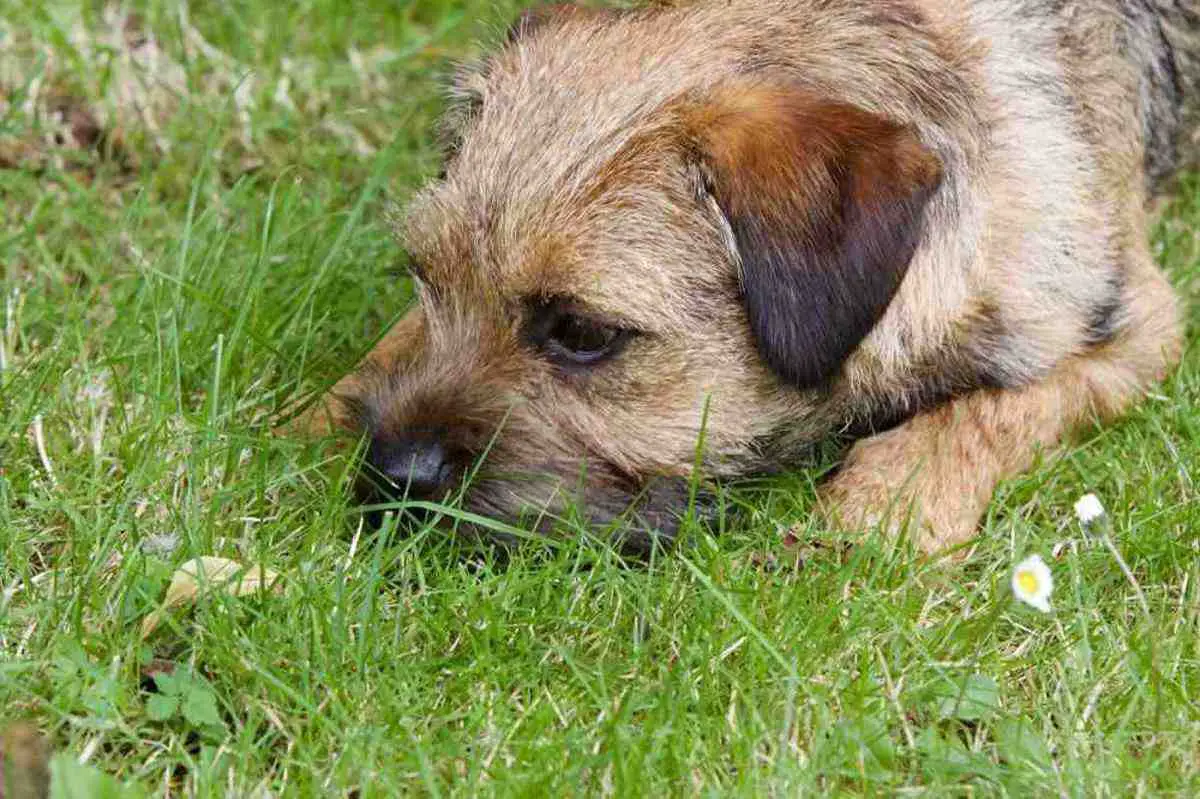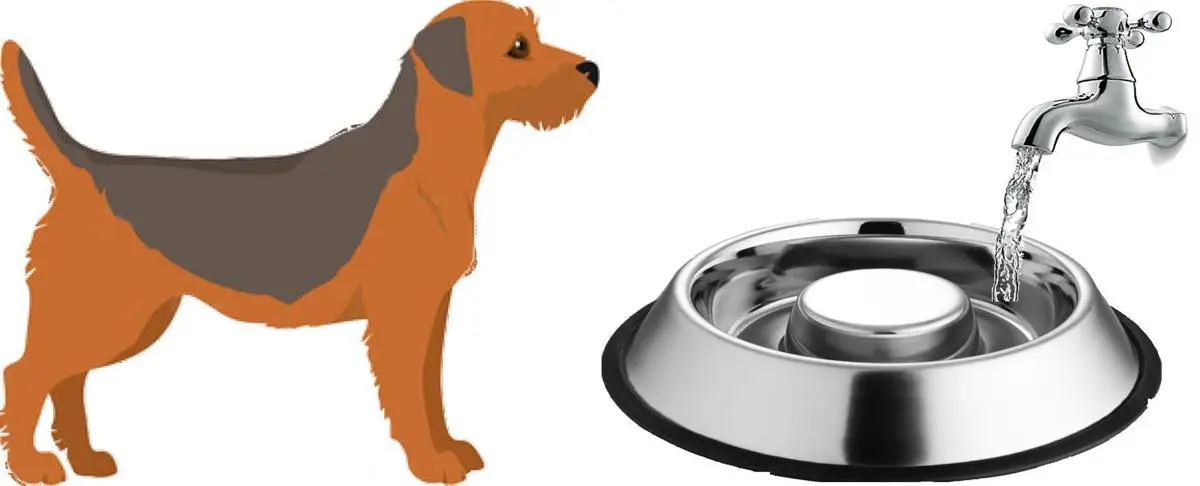Quick Links: Table of Contents
- Border Terrier Breed Overview
- History of the Border Terrier Breed. Where Border Terriers came from
- What the Border Terrier Looks Like
- How Much is the Border Terrier Puppy?
- Best Border Terrier Breeders
- Adopting or Rescuing the Border Terrier
- Border Terrier Growth
- The Temperament of the Border Terrier
- Border Terrier Litter Size
- How Fast Border Terriers Can Run
- Good Names for Border Terriers
- How Intelligent are Border Terriers?
- How Popular are Border Terriers with New Dog Owners?
- Health Problems in Border Terriers and How to Prevent Them
- How to Take Care of Border Terrier
- Dog Breeds That Are Similar to Border Terriers
- Other Things to Know About Border Terriers
Border Terrier Breed Overview
The Border Terrier is a small-sized dog.
The adult Border Terrier stands 10 to 11 inches tall at the shoulder.
The Border Terrier belongs to the Terrier Dogs group.
Dogs in the Terrier Dogs group, like the Border Terrier, were originally bred to go underground to hunt rodents and other small wild animals (vermin).
Terriers come in a wide range of sizes and shapes, but all terriers are energetic, highly intelligent, and territorial. Terries also have the tendency to escape. They require a securely fenced yard.
The fact that the Border Terrier belongs to the Terrier Dogs group is one of the reasons why Border Terriers have the personality and temperament that they have.
The temperament of the Border Terrier is generally described as:
- Affectionate
- Alert
- Even-Tempered
- Fearless
- Intelligent
- Obedient
History of the Border Terrier Breed. Where Border Terriers came from
The Border Terrier was originally known as the Coquetdale Terrier or Redesdale Terrier.
Coquetdale and Redesdale were the birthplaces of the breed.
Because of their association with the Border Hunt in Northumberland, the breed was given the name Border Terrier in the 1800s.
The Border Terrier is thought to be related to Bedlington Terriers and Dandie Dinmont Terriers, both of which originated in the same area.
Farmers and shepherds from the border of England and Scotland developed the breed to help reduce the fox population, which was capable of hunting farm animals.
Foxhunting became a sport in the nineteenth century.
The Border terrier ran alongside the horses and hounds.
Their legs had to be long enough to keep up with them.
.
What the Border Terrier Looks Like
The Border Terrier is distinguished by his otter-like head.
Their skull is broad, and they have a short, dark-colored muzzle.
They have short, coarse hair in red, blue, tan, wheaten, or grizzle and tan colors.
They have small, sharp eyes with a mischievous expression.
They have black noses and small, folded ears that form the letter “V.
” The Border Terrier has strong teeth and a scissor bite, despite having only a few short whiskers on the muzzle.
The tail is medium in length and thick at the base.
The Border Terrier has a short and dense double coat.
Their undercoat is soft, and their outer coat is coarse and dirt-resistant.
.
How Much is the Border Terrier Puppy?

The average price of a Border Terrier puppy is $1160. The price of a Border Terrier puppy ranges from $800 to $1400.
A lot of factors determine the price of the Border Terrier. These factors include what health records the Border Terrier puppy has, the lineage of the Border Terrier puppy, the US state the breeder is located in, etc.
To estimate how much you can expect to pay for a puppy Border Terrier based on the many factors that determine the price of the Border Terrier puppy, check out our calculator that lets you estimate how much you should expect to pay for the Border Terrier puppy based on what you want in the puppy.
When looking to buy a puppy, look at buying a puppy only from well-established breeders that breed puppies primarily for the love of the Border Terrier breed, and secondarily for profit. Do not buy a puppy from a puppy mill. Puppy mills mass-produce puppies in bad living conditions for maximum profit.
You may also consider adopting instead of buying a puppy. Adoption costs are very low compared to the price of a puppy.
Best Border Terrier Breeders
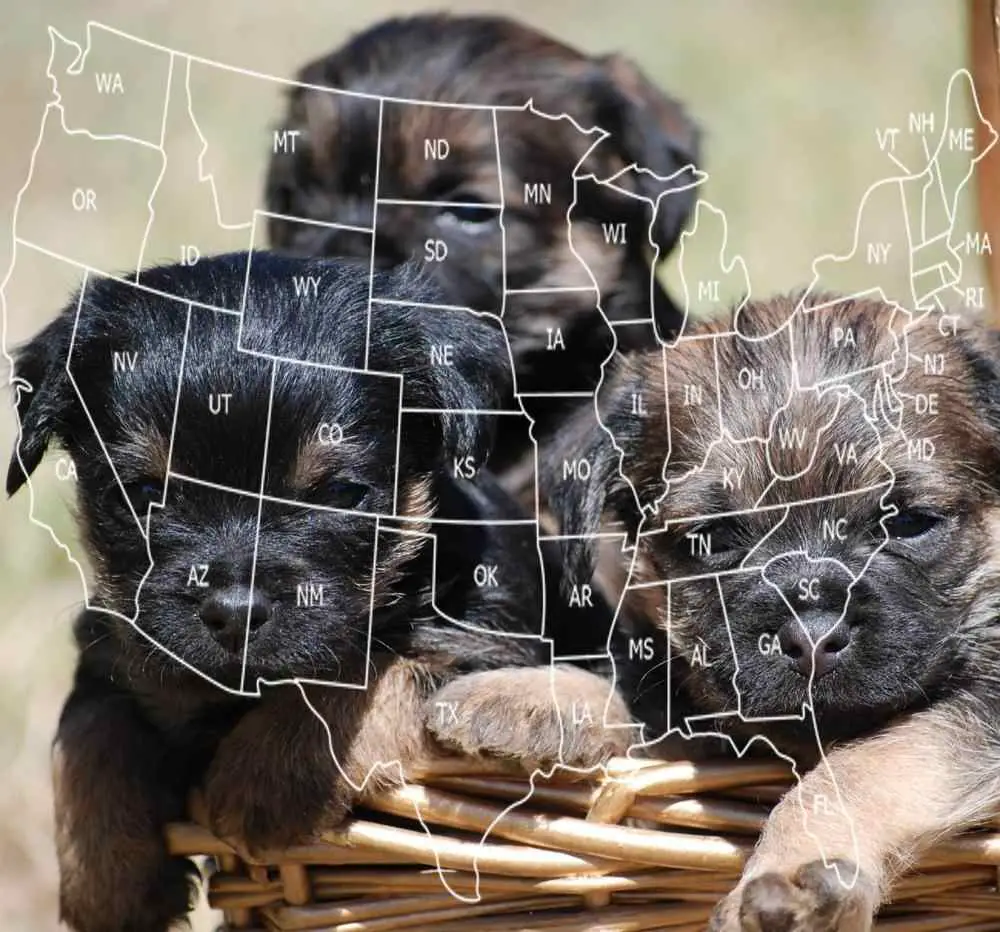
We have researched reputable Border Terrier breeders that you can buy a puppy.
Go to this page for our complete list of reputable Border Terrier breeders in various states in the United States.
On this page, you will see how much these breeders sell their puppies for, and how many puppies they have available.
A few of these breeders are listed below.
Lndi`s Border Terriers
Puppy Price: Check with breeder
Meadow Brook Dalmatians
Puppy Price: $Call Breeder or TEXT this number (760) 912-$0619
Garden Valley Borders
Puppy Price: Check with breeder
Morgan Mills Farm Labrador Retrievers & Border Terriers(865) 256-3528
Puppy Price: Check with breeder
Linda Lowry
Puppy Price: Check with breeder
Adopting or Rescuing the Border Terrier
You may consider adopting a dog instead of buying a puppy. Many dogs, Border Terriers included, are currently available for adoption in your local dog shelters.
These helpless but adorable dogs are waiting in dog shelters hoping that someday someone will rescue them. Dog adoption costs are lesser than the cost of a new puppy. Dog adoption costs are usually around $300 or even less.
In addition to your local dog shelter, another good place to find dogs that are available for adoption is petfinder.com.
Below is an adorable Male Border Terrier named Vegas Edna F that is currently available for adoption on Petfinder.com. You can find other lovely Border Terriers like Vegas Edna F on pefinder.com.

Archie is the name of another Border Terrier (Male) on petfinder.com that is looking for a new forever home.
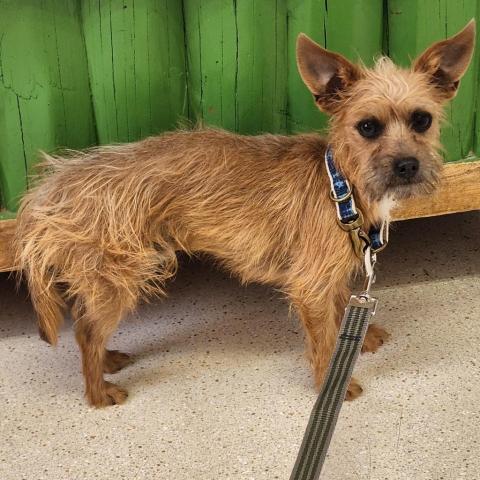
You can find more Border Terriers that are available for adoption on petfinder.
Border Terrier Growth
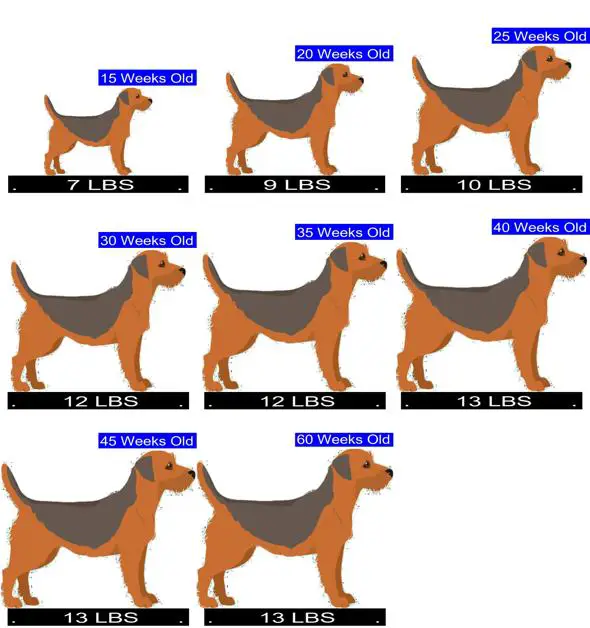
New Border Terrier owners need to know about the growth of their Border Terriers. This will help them plan their living spaces accordingly.
Also, knowing the typical growth pattern of the Border Terrier will help new owners catch the abnormal growth of their Border Terrier early.
See our calculator for predicting how big your Border Terrier puppy will get. You will also learn about the typical weight of the Border Terrier at different ages and how to catch abnormal growth in your Border Terrier
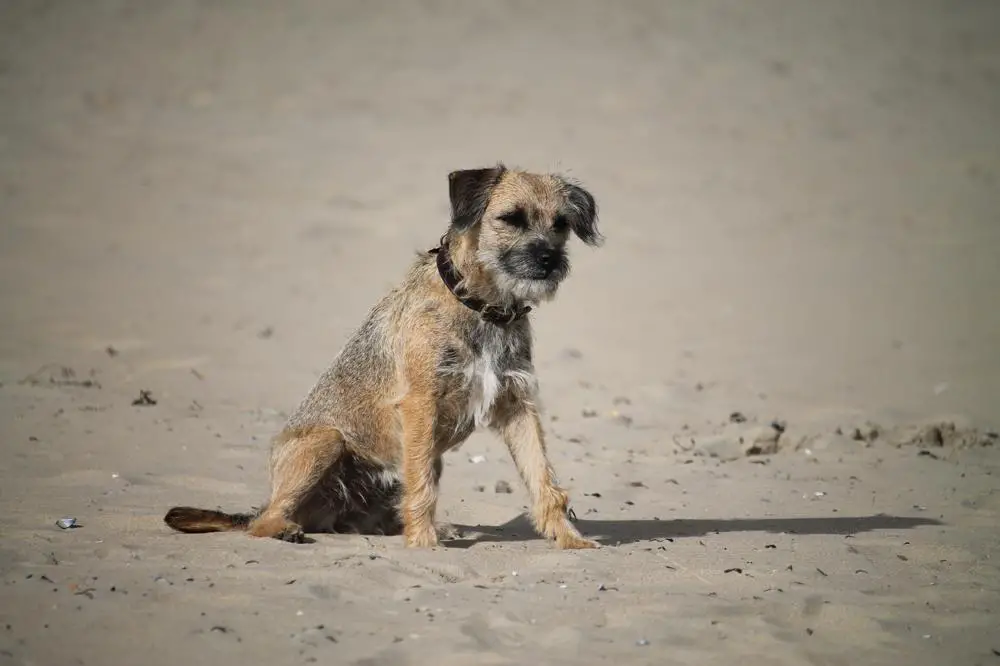
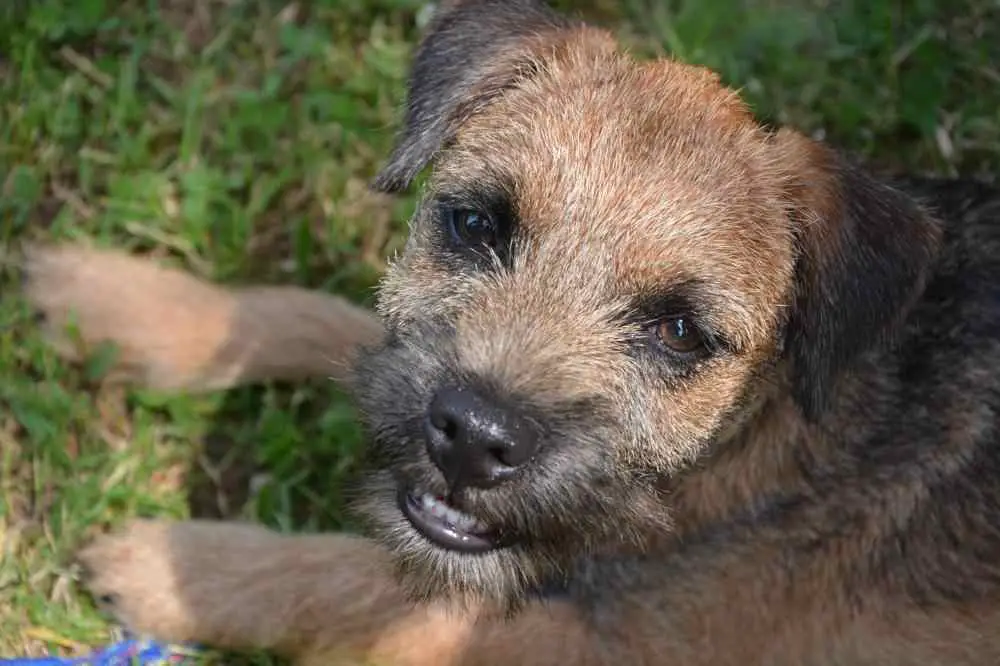
The Temperament of the Border Terrier
The temperament of the Border Terrier based can be summarized as in the table below.
The table shows the scores of the Border Terrier for 13 important dog behavioral factors.
We obtained these scores by analyzing raw data from the C-BARQ dog personality survey tool. The higher the score of a dog for a factor, the worse the temperament of the dog regarding that factor.
The C-BARQ tool was developed by researchers from the University of Pennsylvania, and it is a scientific tool that is used worldwide for reliably measuring the temperament of dog breeds.
See our complete analysis of the temperament of the Border Terrier here.
| Factor | Score |
|---|---|
| Prey Drive | 81.3 percent |
| Dog Directed Fear | 66.9 percent |
| Owner Directed Aggression | 6.0 percent |
| Dog Directed Aggression | 58.5 percent |
| Energy Level | 52.0 percent |
| Attachment Attention Seeking | 50.7 percent |
| Excitability | 37.4 percent |
| Stranger Directed Fear | 34.2 percent |
| Separation Related Behavior | 27.3 percent |
| Touch Sensitivity | 24.7 percent |
| Nonsocial Fear | 21.6 percent |
| Stranger Directed Aggression | 20.5 percent |
| Stubbornness | 18.0 percent |
| Dog Rivalry | 13.8 percent |
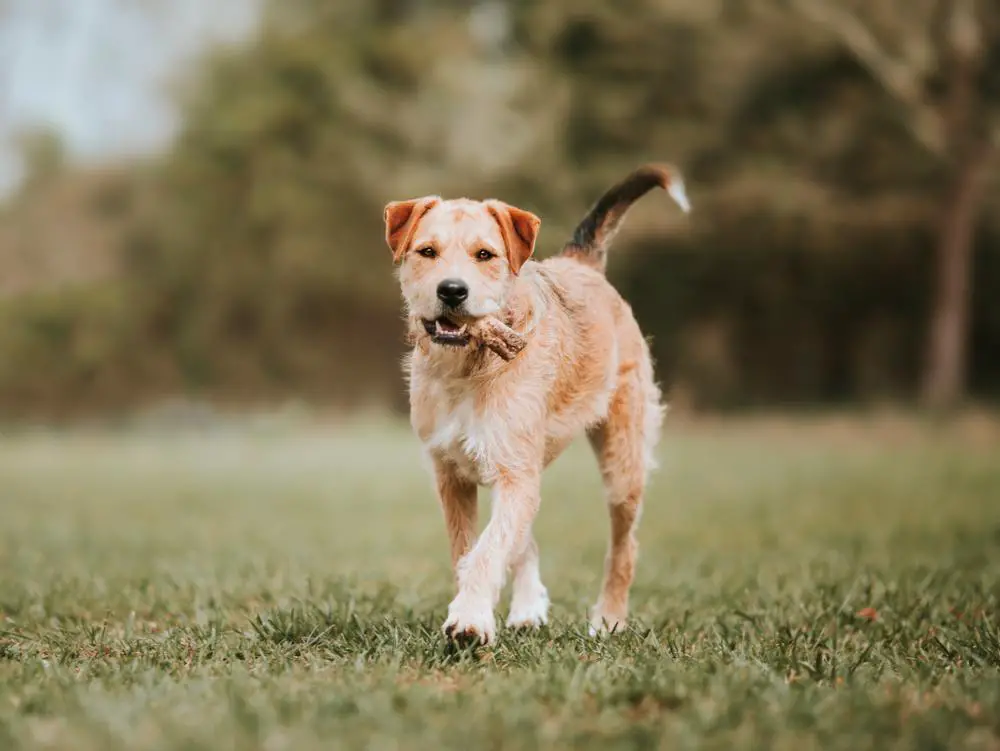
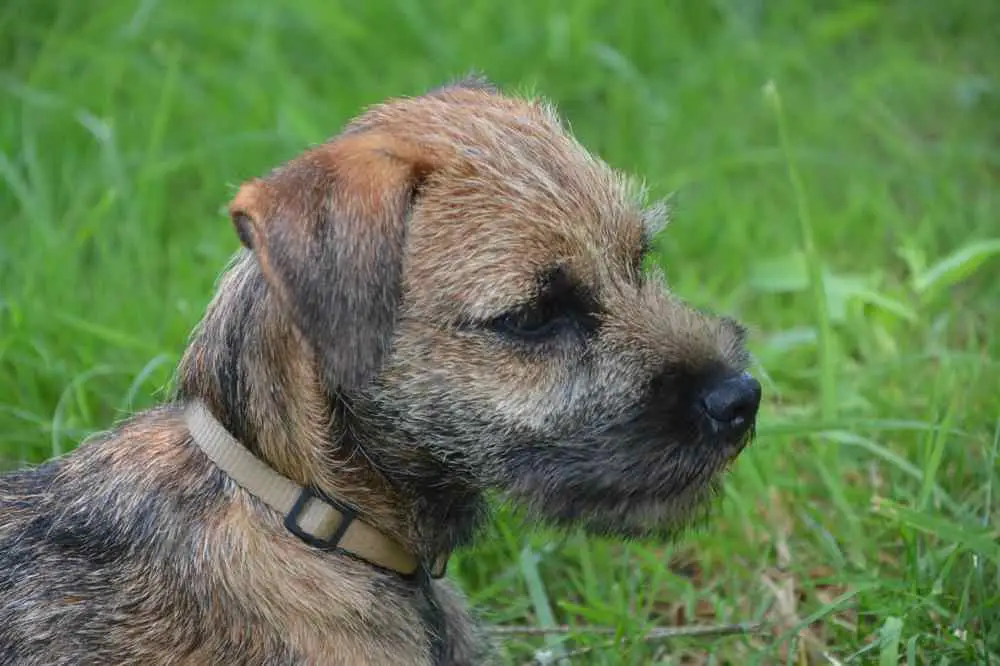
Border Terrier Litter Size
Researchers from the Norwegian School of Veterinary Science did a study where they counted the numbers of puppies in 27 different Border Terrier birth litters.
From this study, the researchers found that the average number of puppies that Border Terriers can have is 5 puppies. Also, the Border Terrier can have as few as 1 puppies per litter and as many as 9 puppies per litter.
The number of puppies that the Border Terrier will have depends on factors such as the age of the Border Terrier, the method of pregnancy, etc.
Click here to see our calculator for predicting how many puppies your Border Terrier will have and how the litter size of the Border Terrier compares to the litter size of other dog breeds.
How Fast Border Terriers Can Run
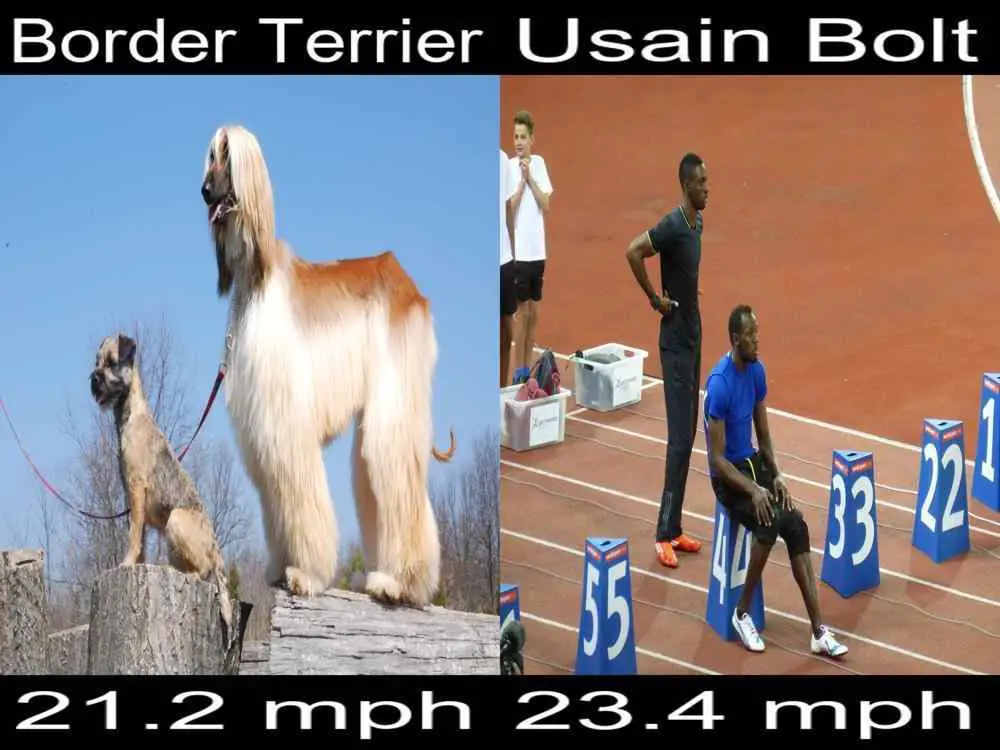
How fast a dog breed can run is a good measure of how athletic the dog breed is.
The American Kennel Club (AKC) regularly conducts dog running competitions. The AKC records the running speed of competing dogs in these competitions. These competitions are open to all dog breeds.
Based on our analysis of the speeds of 337 different Border Terriers, the average speed of the Border Terrier is 21.2 mph (34.1 kmph).
The fastest speed on AKC record that the Border Terrier ran in a race is 27.24 mph (43.8 kmph) and the minimum speed on record in a race for a Border Terrier is 7.93 mph (12.8 kmph).
Click here to see how the speed of the Border Terrier compares to the speed of other dogs and other mammals such as cats, horses, humans, etc.
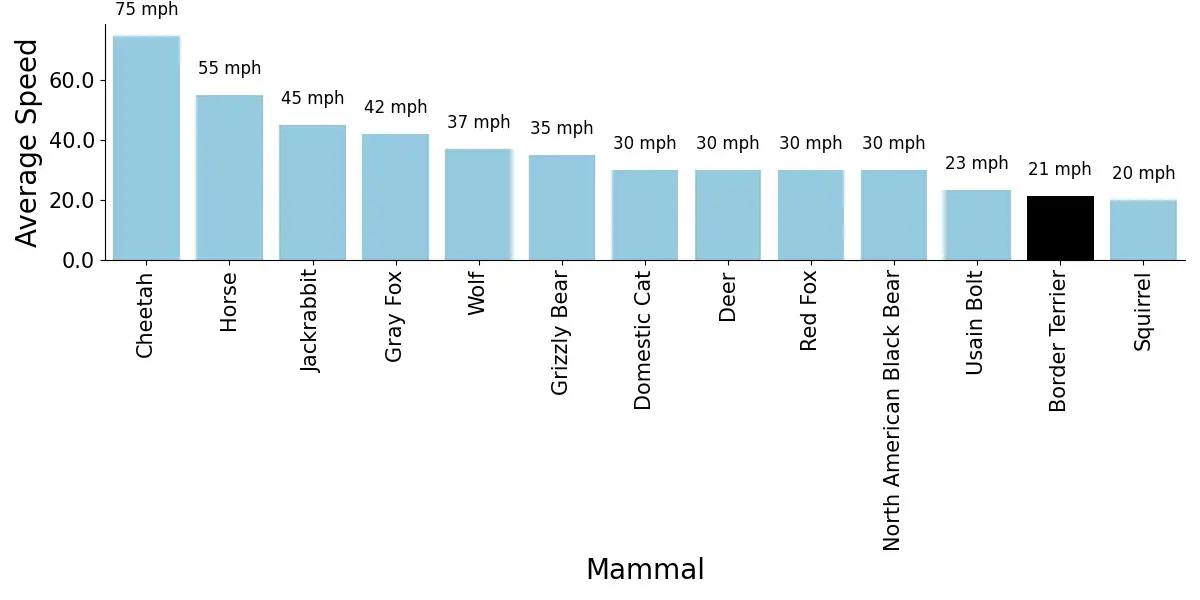
Good Names for Border Terriers
Here are some really good names that are typical for the Border Terrier ranked by popularity:
- Benji
- Bernie
- Forest
- Coco
- Eddie
- Bruno
- Chewie
- Stevie
- Tyson
- Gus
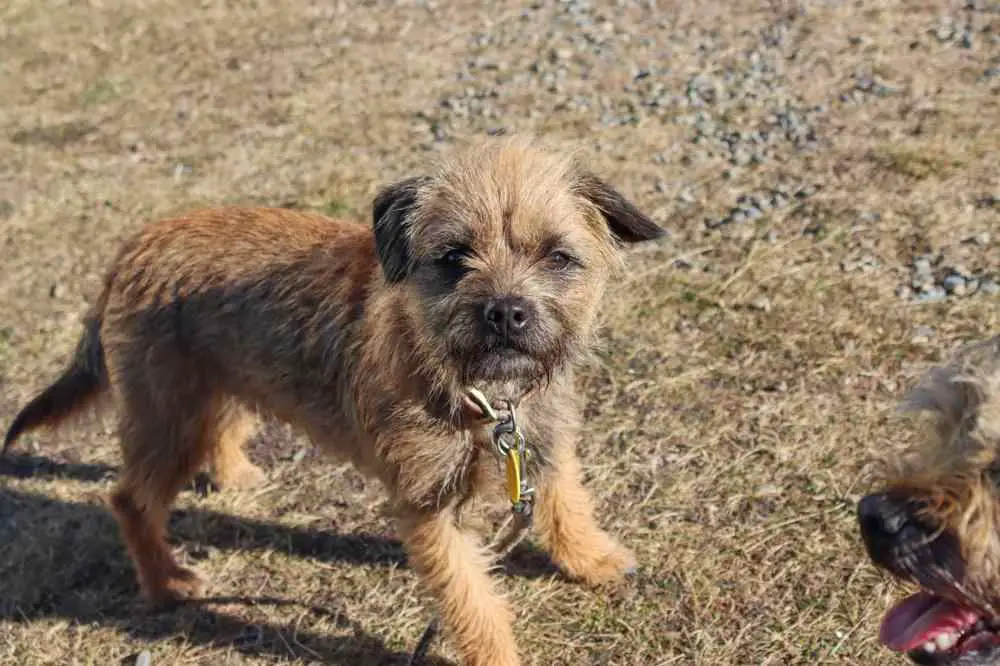
How Intelligent are Border Terriers?
| Border Terrier | |
|---|---|
| Intelligence Rank | 30 out of 130 dog breeds |
| Trainability | Tend To Learn New Commands After 15 To 25 Repetitions |
According to Prof. Stanley Coren, a Canadian psychology professor/dog trainer, the total intelligence that a dog demonstrates is the addition of three types of intelligence. These intelligence types are:
- Instinctive Intelligence: This is the natural intelligence that comes from instinct. For example, dog breeds that have been historically bred to be guard dogs will have a high `guarding` intelligence compared to dogs that were not bred for guarding.
- Adaptive Intelligence (learning and problem-solving ability): This indicates what a dog can learn to do for himself or herself. Adaptive intelligence is specific to each dog, and not breed specific. You can improve your dog`s adaptive intelligence by investing time to train your dog.
- Working/Obedience Intelligence: This type of intelligence is breed-specific. Certain dog breeds tend to have higher working/obedience intelligence than some other breeds. This intelligence is the closest to what we might call school-learning ability and it is based upon what the dog can learn to do when instructed by humans. This type of intelligence can be measured for each dog breed and compared to that of other dog breeds.
Professor Stanley Coren measured and ranked the working intelligence of about 130 different dog breeds.
Prof. Coren found that the Border Terrier has an obedience intelligence rank of 30 out of 130 dog breeds. Thus, Prof. Coren put Border Terriers in the `Above Average Working Dogs` category.
This means that Border Terriers tend to learn new commands after 15 to 25 repetitions.
However, we should mention that a dog should not be judged based on its intelligence alone. There are other important factors you need to consider when deciding on which dog breed to get. These other factors include sociability, adorability, and compatibility of the dog breed with your lifestyle.
See the intelligence ranking of some other dog breeds below:
| Breed | Intelligence Rank |
|---|---|
| Rottweiler | 9 |
| Belgian Sheepdog | 15 |
| Collie | 16 |
| English Cocker Spaniel | 18 |
| Belgian Malinois | 22 |
| Irish Water Spaniel | 24 |
| Cardigan Welsh Corgi | 26 |
| Giant Schnauzer | 28 |
| Airedale Terrier | 29 |
| Affenpinscher | 37 |
| Dalmatian | 39 |
| Boxer | 48 |
| Pug | 57 |
| French Bulldog | 58 |
| Great Pyrenees | 64 |
| Chihuahua | 67 |
| Lhasa Apso | 68 |
| Pekingese | 73 |
| Bloodhound | 74 |
| Chow Chow | 76 |
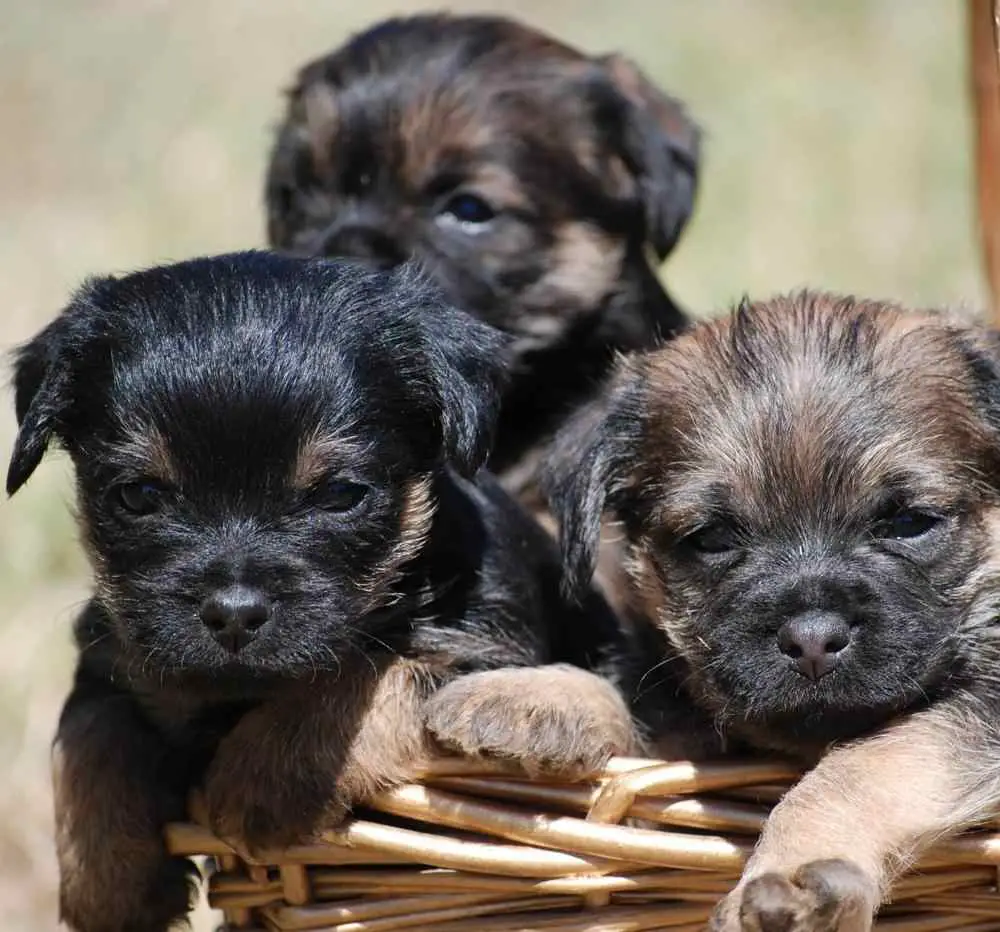
How Popular are Border Terriers with New Dog Owners?
Every year, the American Kennel Club (AKC) publishes information on how popular a dog breed is in that particular year. The AKC gets the popularity information of a breed from how many dogs of that breed the owners register with the AKC every year. The AKC collects this data for about 200 dog breeds.
The graph below shows the popularity trend of the Border Terrier.
The popularity of the Border Terrier averaged over the years is Number 87 out of about 200 dog breeds.
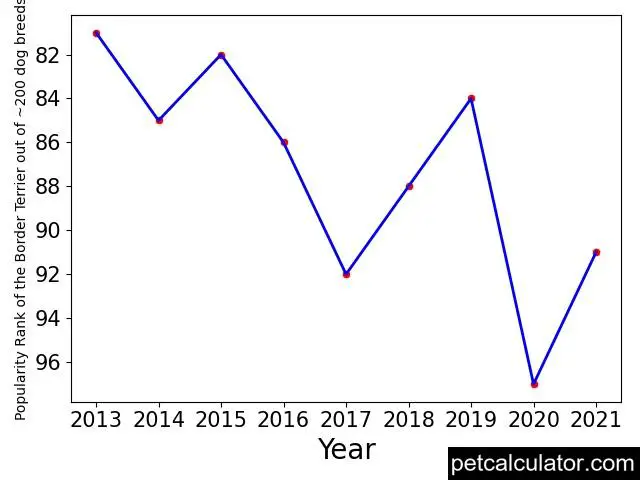
Do not get a dog breed just because it is a popular dog breed. And do not reject a dog breed just because it is an unpopular breed.
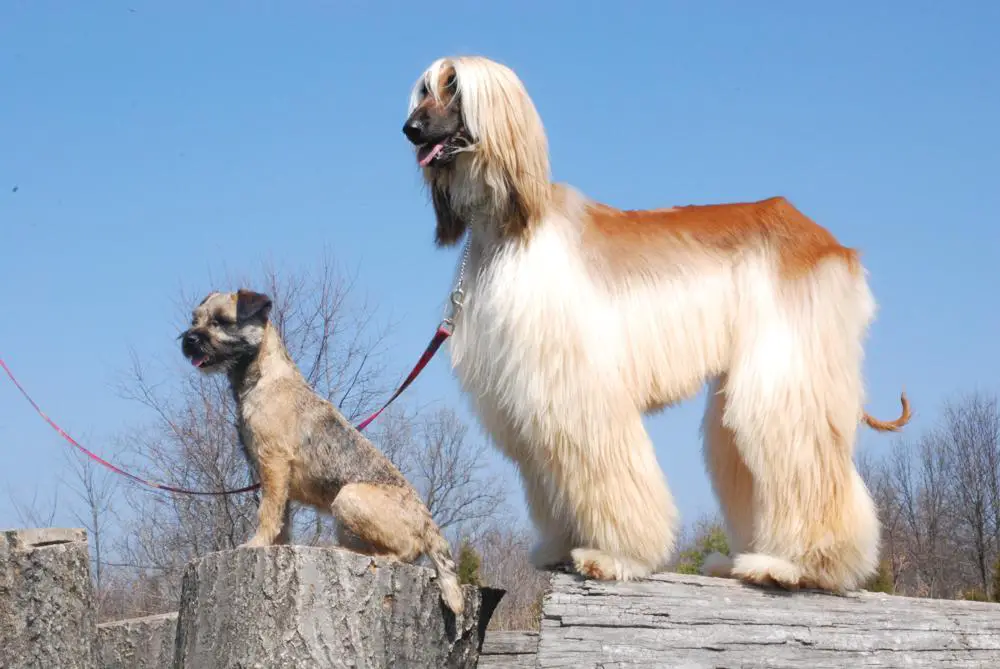
Health Problems in Border Terriers and How to Prevent Them
Every dog breed has its own set of health problems that it tends to develop. There is nothing like a perfect dog breed.
The Border Terrier is prone to certain genetic health conditions. The Orthopedic Foundation for Animals (OFA) is an organization that keeps track of genetic health problems in dog breeds.
From the extensive records that the OFA keeps, the OFA knows what health problems each dog breed is naturally prone to develop.
Hence, the OFA recommends which health screening breeders should perform on a dog breed to make sure that the breeders won`t breed `defective` dog parents that can pass down defective genes to their puppy offspring.
If you want a Border Terrier puppy that will grow up to be healthy, make sure that your Border Terrier breeder screens your puppy or your puppy`s parents for the health problems that the OFA recommends for your puppy`s breed. This will increase the chances that your puppy is free from genetic defects.
The following are the health tests that Orthopedic Foundation for Animals (OFA) recommends that breeders should screen Border Terriers for:
- Cardiac Evaluation
- Eye Examination annually until at least Age 8ys (96mo)
- Hip Dysplasia
- Patellar Luxation
- Spongiform Leukoencephalomyelopathy (SLEM)
You can find out more about OFA`s recommended tests for Border Terriers here.
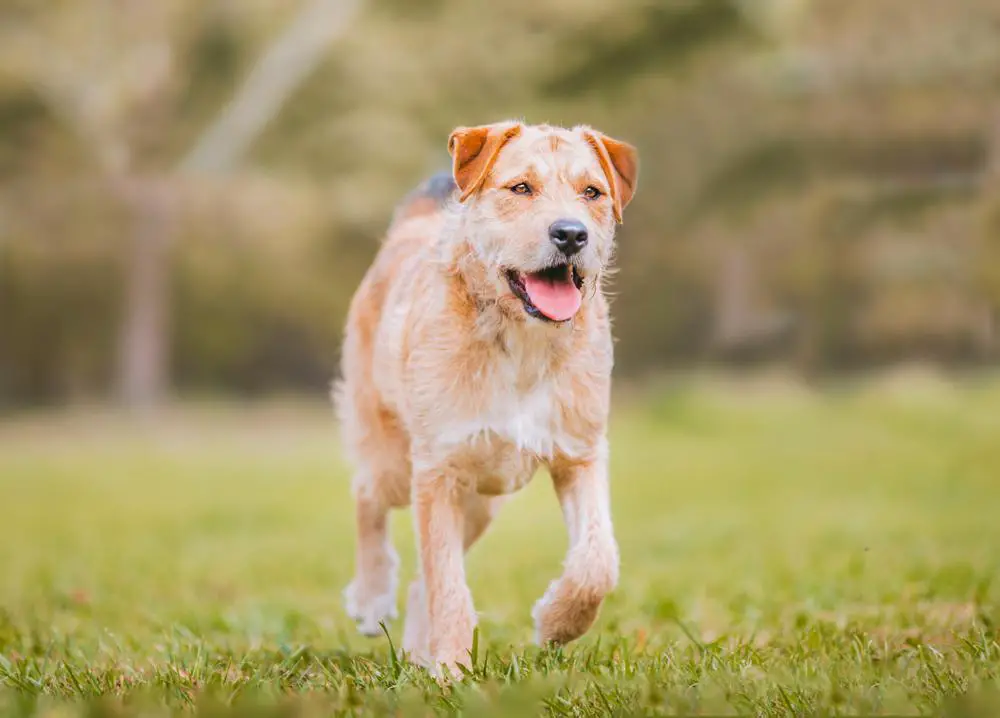
How to Take Care of Border Terrier
To take good care of your Border Terrier, you need to make sure that you groom your Border Terrier regularly.
Secondly, you need to find a veterinarian in your area that will routinely check the health status of your Border Terrier regularly, and give you appropriate recommendations on your Border Terrier`s preventative care.
Thirdly, you need to commit some time to exercise your Border Terrier daily. Regular exercise helps improve the health and quality of life of your Border Terrier.
Also, you need to feed your Border Terrier high-quality dog food, and the food should be of the right amount to prevent your Border Terrier from getting overweight or underweight.
See our recommendations on what to feed the Border Terrier and how much food to feed the Border Terrier at different life stages.
Finally, you need to make sure that your Border Terrier has access to clean water all the time. See our recommendations on how much water your Border Terrier needs to drink at different ages.
Dog Breeds That Are Similar to Border Terriers
If you have not made up your mind on which dog breed to get, you may also want to consider some other dogs similar to the Border Terrier.
We crunched the numbers and found that the following dog breeds that have similar behavior and temperament as the Border Terrier:
- Bedlington Terrier (73 percent match with Border Terrier). Learn more about the Bedlington Terrier here.
- Jack Russell Terrier (72 percent match with Border Terrier). Learn more about the Jack Russell Terrier here.
Other Things to Know About Border Terriers
Here are some of the very important characteristics of the Border Terrier that you need to know about the Border Terrier breed:
